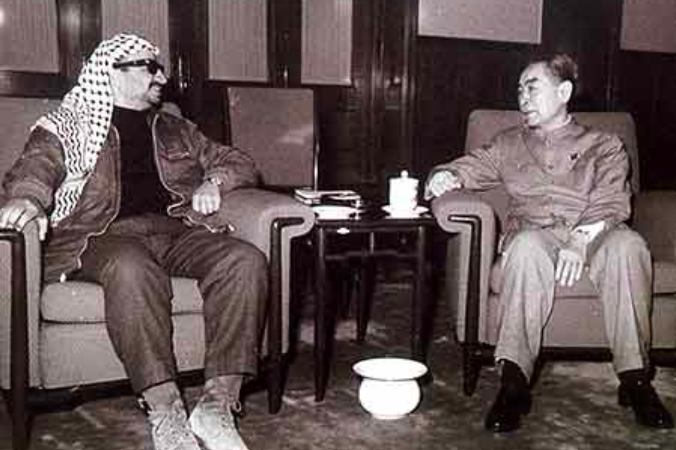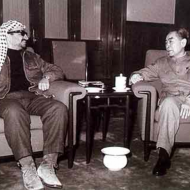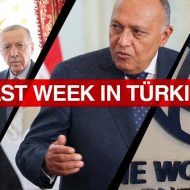By Orçun Göktürk / President of the Turkish-Chinese Belt and Road Institute
More than 70 years of occupation and massacres by a Zionist organization shaped by the ideology of the “promised land”, which is far beyond being a human tragedy, were answered by the “Al-Aqsa Flood” of Palestinians defending their homeland on the morning of October 8. The so-called impenetrable “Iron Dome” was breached, and a people defending their right to legitimate resistance against the occupation gave hope again not only to Palestinians but to all oppressed nations.
While Western media outlets continue to describe the “shocking attack”, “the end of Netanyahu’s political career”, “the collapse of the US policy towards Israel”, “a major intelligence failure”, “the result of arrogance and overconfidence”, this article will try to look at the issue from the perspective of the People’s Republic of China’s view of the Palestinian issue from history to the present and its impact on the change in China’s foreign policy concept, especially in West Asia.
How possible is ‘peaceful coexistence’ with Israel?
In December 1953, Zhou Enlai, a prominent figure of the Chinese revolution and then Prime Minister of China, presented the “Five Principles of Peaceful Coexistence” to the world after meeting with his Indian counterparts. Initially intended for bilateral relations between China and India, these principles attracted the attention of oppressed nations and were adopted in the same way at the Asia-Africa Conference in Bandung, Indonesia in 1955, which would later lead to the Non-Aligned Movement. Thus, these 5 principles, presented by Zhou Enlai and China, became the norm underlying the new international relations adopted by the majority of the peoples of the world, except for a handful of imperialists. In 1970, the United Nations General Assembly was forced to adopt the “Declaration of Principles of International Law Concerning Friendly Relations and Cooperation among States”.
The oppressed nations’ desire for a more equal and equitable international order has entered a new phase in the 21st century with the rise of Asian countries, especially China. Undoubtedly, history moves forward on the legacy and problems of the past. We will not go into the origins and the problems created by the state that Israel established after World War II by occupying the Palestinian territories with the intervention of the UN. But first and foremost, the question stands before humanity: How possible is it to live together in peace with a “state” that has been the ideology of massacre for decades?
Palestine Liberation Organization and China
As for China’s position on the Israeli-Palestinian issue, until the 1980s, China was one of the frontline advocates of the Palestinian cause. China was the first non-Arab foreign country to extend an official invitation to the Palestine Liberation Organization (PLO) and to host the PLO. China recognized the organization as the sole and legitimate representative of the Palestinian people and granted its office in Beijing all the diplomatic privileges accorded to foreign embassies, which helped to strengthen its international standing. There were even allegations in the Western media at the time that ideological and military training had been provided to the PLO throughout the Mao era. (1)
PLO and Fatah representatives met with Chinese government officials on numerous occasions from the 1960s to the early 2000s. Yasser Arafat visited China 14 times between 1964 and 2001. The internationally published Peking Review also published several articles by the PLO and Fatah leadership, in one of which Arafat described China as “the greatest influence in supporting our revolution and strengthening its resolve.” (2) It should be noted that the PLO opened a liaison office in Beijing during this period.
Mao: They created Israel and Taiwan against us
During a PLO’s visit in 1965, Mao Zedong famously said: “Imperialism is afraid of China and the Arabs. Israel and Formosa [Taiwan] are the bases of imperialism in Asia. You are the front door of this great continent; we are the back door. They created Israel for you and Formosa for us. The West does not really like us and we must understand this fact. The Arab war against the West is a war against Israel.” (3)
In the 1970s, China’s support for Palestine continued even in a climate of increasing conflict with the USSR and China. For example, at the UN session on the “Palestine Question” in 1976, Huang Hua, China’s first permanent representative to the UN, emphasized:
“The Chinese government and people have always resolutely supported the Palestinian and other Arab peoples in their just struggle to regain their national rights and reclaim their lost lands, resolutely condemned Israel’s Zionist aggression, and resolutely opposed the superpowers’ rivalry and expansionism in the Middle East.” (4)
With all this, the Chinese people’s support for Palestine has also increased. For example, on May 15, 1965, the first “Day of Solidarity with Palestine” demonstrations began and continued regularly every year until 1971. After the deaths of Mao Zedong and Zhou Enlai, China changed its policy and moved towards more moderate relations with Israel. Of course, the international developments of the period, such as Egyptian leader Anwar Sadat’s visit to Israel in 1977, the Fez Plan, the Egypt-Israel Peace Treaty and the Madrid Conference, also influenced China’s change in attitude.
1989 is noted in Chinese foreign policy as the year of China’s first direct international action to intervene in a conflict in West Asia, taking both sides into account. On this date, then Chinese Foreign Minister Qian Qichen announced a 5-point peace proposal on the Palestinian-Israeli conflict. Nevertheless, China and Israel were not fully able to establish diplomatic relations until 1992. After 1992, the two countries made bilateral relations diplomatic official by appointing embassies and after this date, Israel and China developed technological and economic relations, especially in the defense industry.
New International Order and Palestine
In the US National Security Strategy for 2022, China is described as “the only state with both the will to change the international order and the economic, diplomatic, military and technological power to do so.” (5) Of course, China’s post-Mao foreign policy strategy of “emphasizing economic development while avoiding attention and conflict” continues to have an impact. But the recent geopolitical ruptures and the increasingly hostile attitude of the US towards Beijing are reminding China of the imperative law of history. That is why in 2021, after the US fled Afghanistan, Taliban officials were hosted at the Great Hall of the People in Beijing, Iranian leader Ibrahim Reisi and Saudi Arabia’s Crown Prince Mohammed bin Salman met face-to-face with Xi Jinping, and then the two countries’ foreign ministers came together in Beijing and decided to resume diplomatic relations after a seven-year suspension. In the West’s eyes, in the Russia-Ukraine conflict, China has been “providing Russia with economic and diplomatic sanctuary” and “creating problems by strictly refraining from condemning Russia”. China’s 12-point position paper proposal to end the war in Ukraine was criticized by Ukraine and the West for giving Russia territorial gains.
The influence of the Xi Jinping-era strategy of “Great State Diplomacy” (大国外交) and the Belt and Road Initiative on all these developments cannot be denied. Indeed, during Mahmoud Abbas’ visit to Beijing in 2017, Xi reiterated China’s position: 1967 borders, an independent Palestinian state with East Jerusalem as its capital, and support for a two-state solution. Xi also reiterated his support for halting new settlement construction in the Israeli-occupied territories as required by UN Resolution 2334 and for the resumption of peace talks as soon as possible, both in his meeting with Abbas in Beijing in 2017 and again in June 2023. (6) In addition, China has tried to encourage Israel and Palestine to end the conflict through a model of joint development within the Belt and Road Initiative. But convincing the Zionist regime in Israel to make peace is not at all like bringing Iran and Saudi Arabia together. In light of the latest developments, Chinese policymakers are again realizing this, as the Chinese Foreign Ministry on Monday did not unilaterally condemn Hamas, as the West had expected, but rather stated that the solution lies in the establishment of an independent Palestine. (7)
Yes, we are in a period of the decline of US hegemony and the evolution of the world into a multipolar structure. But the oppressed nations still have a long and difficult road ahead. The Palestinian issue will be resolved on the axis of the struggle against the Zionist regime in the geopolitics of West Asia in particular and the world in general. The emerging world needs to understand that, just as Mao said, the loss of power of Israel, the US base in West Asia, will strengthen the hand of not only the Palestinians but also the Eurasianist forces from the Eastern Mediterranean to the South China Sea. Knowing this, the US is sending its aircraft carriers to the region. This is why Ukraine has declared its full support for Israel and Israeli flags are displayed on public buildings of the Kiev regime. This is also why the anti-Chinese separatist government in Taiwan has condemned Hamas, saying that they stand with Israel. (8) The warships sent by the US to the region threaten not only Palestine but also the countries of the developing world, starting from the Eastern Mediterranean to the Strait of Hormuz and from there to the South China Sea. The developing world needs a common response to this common threat.
Cover photo: On March 27, 1970, Zhou Enlai met in Beijing with Yasser Arafat, chairman of the Executive Committee of the Palestine Liberation Organization (PLO), and expressed China’s resolute support for the righteous cause of the Palestinian people and the people of other Arab countries. Photo source: www.china.org.cn
Sources
(2) Cited in: Harris, L. C. (1977). China’s Relations with the PLO. Journal of Palestine Studies, 7(1), 123–154.
(3) Arab World (Beirut), “Mao Tse-tung Urges Arabs Boycott West,” April 6, 1965. Another source, see: John K Cooley, “China and the Palestinians,” Journal of Palestine Studies 1, no. 2 (1972): 21,
(4) https://www.un.org/unispal/document/auto-insert-181423/
(6) https://www.fmprc.gov.cn/eng/wjdt_665385/wshd_665389/202306/t20230618_11099414.html
(7) https://www.fmprc.gov.cn/mfa_eng/xwfw_665399/s2510_665401/202310/t20231008_11157299.html
(8) https://www.taipeitimes.com/News/front/archives/2023/10/09/2003807416









Leave a Reply